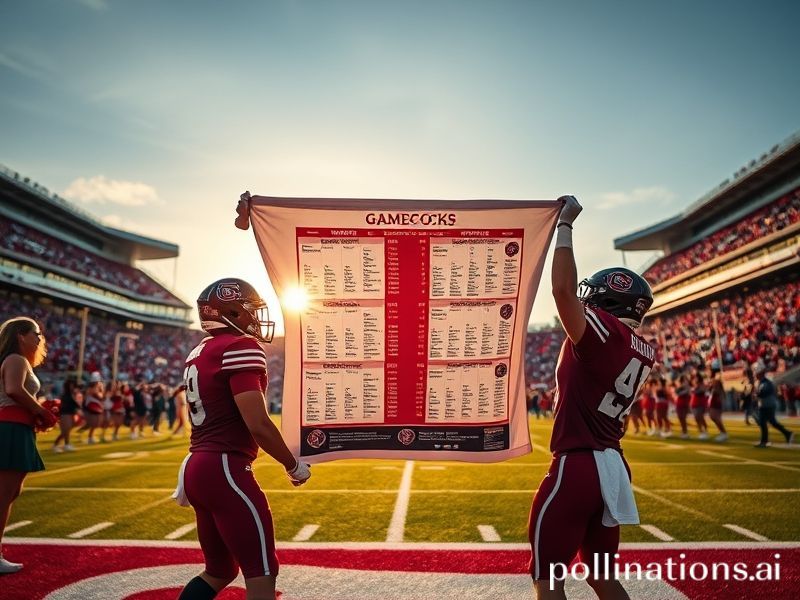Why South Carolina’s Football Schedule Is Quietly the Most Honest Foreign Policy Document of 2024
Columbia Calling: How South Carolina’s 2024 Football Slate Quietly Mirrors a Fracturing World Order
By Dave’s Locker Global Affairs Desk
The first thing an overseas observer notices about South Carolina’s freshly released gridiron itinerary is not the games themselves—nobody in Marseille is losing sleep over Furman—but the exquisite way the schedule replicates great-power anxiety. Week 1, August 31, USC hosts Old Dominion, a school whose very name sounds like a Brexit negotiation. Week 2, Kentucky arrives, a polite reminder that empires shrink into regional conferences. Week 3, South Carolina steps onto the road like a minor Baltic state eyeing NATO membership: LSU, Baton Rouge, Saturday night, 102,000 locals baying for blood. If the metaphor feels overwrought, remember that American tailgates now require fewer visas than most Schengen crossings.
European readers will appreciate the tidy imperial echo on October 19, when Texas A&M appears. The Aggies cling to SEC membership the way Britain clings to the Falklands—out of nostalgia, inertia, and because the oil might still pay for stadium renovations. The game is in Columbia, but the psychological contest is in College Station’s endowment office, where donors still believe a 12-2 season buys geopolitical relevance. Spoiler: it buys only slightly better brisket.
Turn the schedule sideways and it reads like a trade ledger. November 2 at Oklahoma: one emerging Sooners brand, newly flush with Disney money, meets a Gamecocks program forever balancing the books on hope and 4-star recruits. The line in Vegas opened at Oklahoma –7.5, which curiously matches the IMF’s projected spread between U.S. and eurozone Q4 growth. Coincidence, surely.
Asian markets, meanwhile, will monitor the November 23 Clemson clash with the weary attention usually reserved for North Korean missile tests. The rivalry—equal parts frat bacchanal and blood feud—has become the SEC’s proxy war for cultural supremacy. Tencent’s streaming numbers last year topped 2.3 million unique devices, mostly insomniac day-traders in Shenzhen who find American amateurism refreshingly honest after watching Chinese Super League salaries implode. The game kicks at noon Eastern, which is 1 a.m. in Singapore: perfect timing for margin calls and bourbon.
Not that South Carolina’s season lacks diplomatic soft power. September 14 brings Akron to town, a school so geographically and athletically non-threatening it might as well be Luxembourg. The Zips will collect a $1.7 million guarantee, roughly the cost of Luxembourg’s annual defense budget. Everyone wins: Akron funds another campus climbing wall; Columbia enjoys a 42–10 victory that looks respectable on the résumé of a future assistant coach who will, inevitably, be fired in three years.
Connoisseurs of decay will savor the mid-season lull: October 12 versus Missouri, a matchup whose combined national titles equal Liechtenstein’s naval victories. The contest is scheduled for ESPN2, sandwiched between infomercials for reverse mortgages and a documentary on cryptocurrency fraud. Viewers in Nairobi will mistake it for performance art.
All of this, of course, serves the greater American pastime of pretending Saturday tribal warfare has no connection to Monday drone strikes. But the schedule’s real genius lies in its unspoken promise: whatever chaos unfolds—hurricanes, pandemics, election years—South Carolina will still play 12 games, and the tailgate lots will still smell of mustard and existential dread. That constancy is more reassuring than any UN resolution.
By December 7, when the regular season closes at home against Wofford, the planet will have rotated 1.3 billion miles and the Gamecocks will have either exceeded or failed expectations by exactly one score. Either way, the international implications are nil, which is precisely why they matter. In a world that can’t schedule next month’s ceasefire, college football still prints next August’s calendar in neat, reassuring columns. The cynic calls it bread and circuses; the realist calls it the only functioning calendar left.







